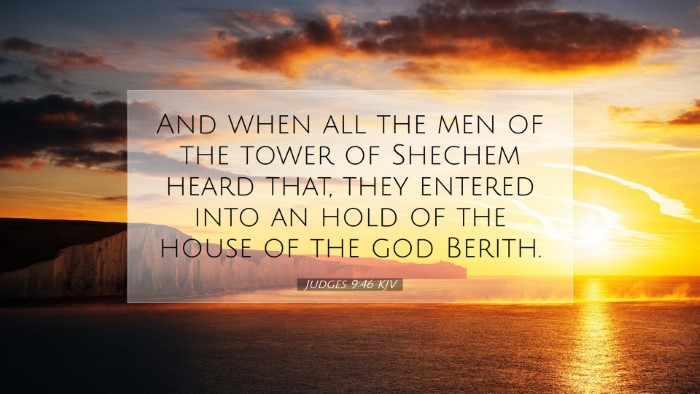Bible Commentary on Judges 9:46
Judges 9:46: “And when all the men of the tower of Shechem heard that, they entered into an hold of the house of the god Berith.”
Introduction
The events of Judges 9 provide a pivotal moment in Israel's history, especially in the life of Abimelech and the dynamics of leadership. Judges 9:46 describes the reaction of the men of Shechem as they take refuge in the “hold” of the house of Berith, indicating a time of fear and desperation.
Historical Context
The historical setting of this verse is crucial for understanding its implications. Abimelech, a son of Gideon, sought to establish himself as king over Israel but did so through treachery and violence. Following his conquest, the men of Shechem find themselves in dire straits, faced with the wrath of Abimelech, who is driven by ego and bloodlust.
Key Characters
- Abimelech: A controversial figure whose rise to power is marked by fratricide and manipulation.
- Men of Shechem: Supporters of Abimelech who now face the consequences of their actions.
- Berith: The god of the covenant worshipped by the Shechemites, symbolizing both idolatry and misplaced faith.
Theological Insights
This passage encapsulates a key biblical theme: the consequences of leadership decisions and the pervasive impact of idolatry.
The Consequences of Idolatry
Fleeing to the “hold” of Berith suggests a tragic irony; the very god they trusted in could not save them from destruction. Commentators like Matthew Henry emphasize this point, noting that the reliance upon false gods leads to vulnerability in times of crisis.
The Nature of Leadership
Abimelech's leadership brings forth devastating results. Albert Barnes points out that legitimate authority must be rooted in righteousness and the fear of the Lord. In contrast, Abimelech’s tyrannical rule leads to chaos, demonstrating that human leaders can wield great power yet bring immense ruin. His rise to power is filled with violence and deception, highlighting the moral decay within Israel during this period.
Commentaries on the Text
Several public domain commentaries provide valuable insights into the meaning of this verse.
Matthew Henry's Commentary
Henry explains that the men of Shechem’s retreat into a stronghold reflects their fear and guilt over supporting Abimelech. They had once placed their faith in a leader who promised security but delivered violence instead. This illustrates the fleeting nature of trust placed in worldly leaders who do not uphold truth and justice.
Albert Barnes' Notes
Barnes elaborates on the significance of the house of Berith, remarking that it symbolizes misplaced priorities. The fact that they sought refuge in a temple of a false god sends a clear message about the disillusionment of the people; they understood the danger yet relied on their idols rather than turning back to the God of Israel for deliverance.
Adam Clarke's Commentary
Clarke insights into the imagery of the hold signify a desperate clinging to what they knew. Being in a “hold” may also imply a sense of isolation from God's providence. He notes that true security comes from faith in Yahweh, rather than in human institutions or idols. The Shechemites were caught in a cycle of despair rooted in their idolatrous practices.
Application for Believers
The passage of Judges 9:46 provides a stark warning and a call to reflection for contemporary believers.
Seeking True Refuge
Pastors and theologians should emphasize the importance of directing congregations to seek their refuge in God rather than worldly systems. The stronghold of Berith failed to protect the Shechemites; in the same way, any dependence on secular ideologies or idols will ultimately disappoint.
The Role of Leadership
For students of theology, this text serves as a crucial exploration of the ethics of leadership. Integrity, humility, and accountability are virtues that must accompany anyone in authority. The narrative of Abimelech prompts a deep examination of how leaders can sway public opinion and the responsibilities that accompany power.
Idolatry's Consequences
Furthermore, this commentary aligns well with the broader biblical narrative concerning idolatry. Discerning contemporary forms of idolatry is necessary for effective ministry today. Just as the Shechemites turned to Berith, modern believers must guard against placing their trust in materialism, power, or convenience rather than in God alone.
Conclusion
Judges 9:46 encapsulates the tragic outcomes of misguided leadership and the folly of idolatry. It serves as a reminder for all believers to center their faith in God, to seek genuine security through divine leadership, and to critically examine the motives behind their trust in others. The lessons gleaned from the downfall of Abimelech and the fearful retreat of the men of Shechem remain relevant today, encouraging a reliance on the true God who holds the ultimate power for rescue and security.


